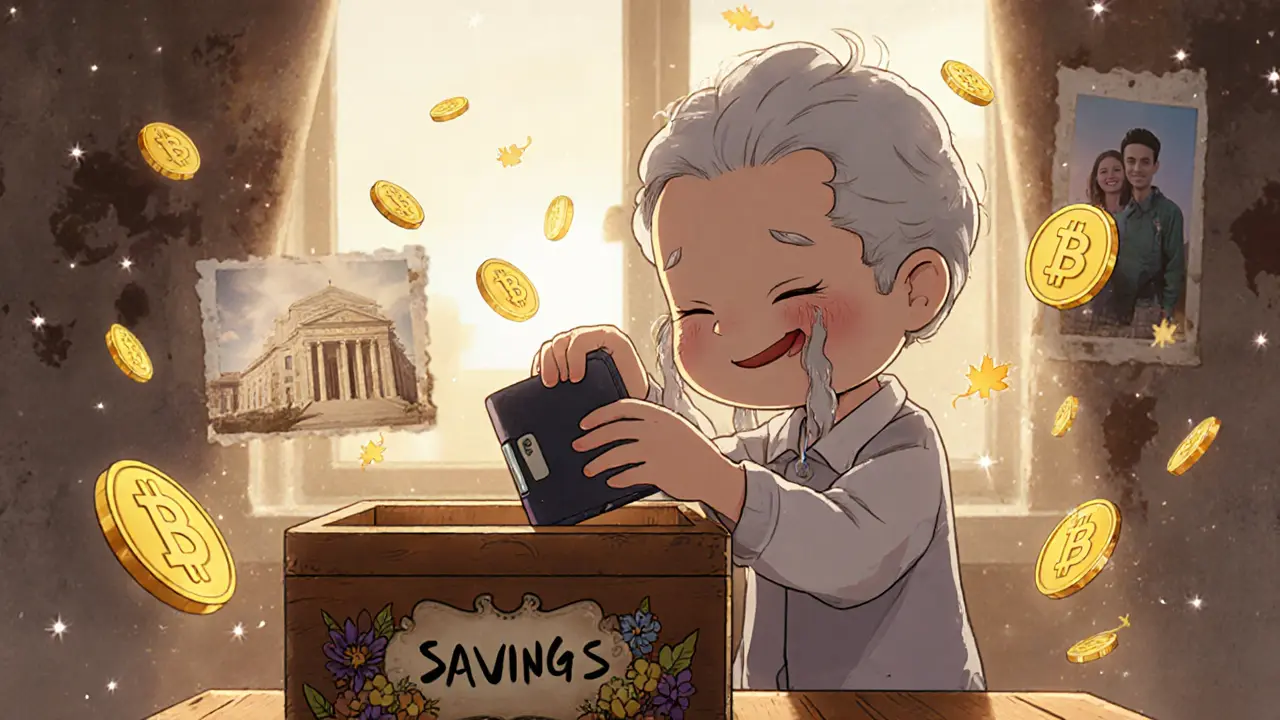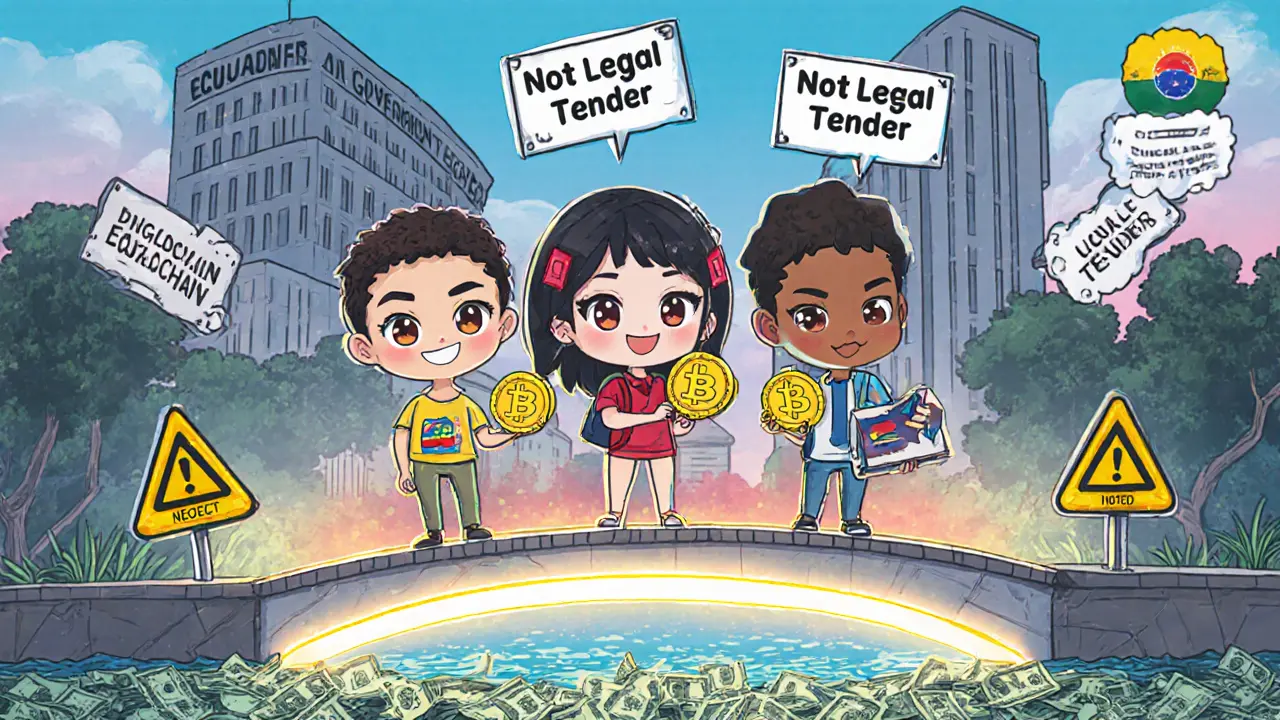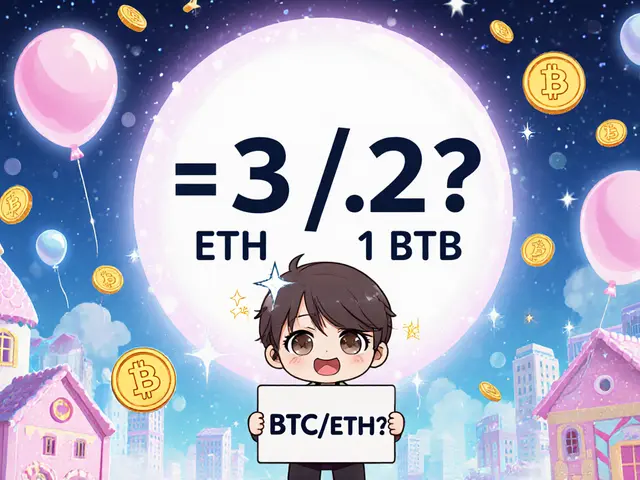Remittance Fee Calculator
There’s no official underground crypto market in Ecuador - not one that’s documented, tracked, or busted by authorities. But that doesn’t mean people aren’t trading crypto outside the system. In fact, thousands of Ecuadorians do it every day, not because they’re breaking the law, but because the legal system doesn’t always meet their needs.
Legal Crypto Is Allowed - But It’s Not Easy
Ecuador lifted its ban on cryptocurrencies in 2021 after a failed attempt to launch its own state-backed digital currency, the Ecuadorian Digital Currency. Since then, buying, selling, and holding Bitcoin, Ethereum, and other tokens is legal. But here’s the catch: you can’t use them to pay for groceries, gas, or rent. Banks won’t process crypto payments. Merchants don’t accept them. So while it’s legal to own crypto, it’s not useful for daily life. That’s where the real story begins. People still need to move money. Inflation hit 10% in 2024. The local currency, the U.S. dollar, is stable but hard to earn. Salaries don’t keep up. Many families rely on remittances from abroad - but wire transfers cost 7% to 10% in fees. That’s why crypto, especially stablecoins like USDT, became a quiet lifeline.How People Actually Trade Crypto in Ecuador
Most crypto trading in Ecuador happens on legal platforms like Binance P2P, Bit2Me, and LocalCoinSwap. These aren’t underground - they’re registered, KYC-compliant, and monitored. But the way people use them feels underground because it bypasses banks entirely. Here’s how it works: A person in Guayaquil needs $200 to pay a medical bill. They can’t get a loan from a bank. Instead, they open Binance P2P, find a seller offering USDT for cash, and meet at a coffee shop. They hand over $200 in cash. The seller sends $200 worth of USDT to their wallet. No bank. No paperwork. No waiting. This isn’t illegal. Ecuador’s Superintendency of Companies, Cryptocurrencies, and Digital Assets allows peer-to-peer trades as long as both parties are verified. But because these trades happen face-to-face, in person, with no digital trail beyond the blockchain, they look like black market activity - even when they’re not.Why the Myth of an Underground Market Persists
There’s no secret network of crypto smugglers or dark web exchanges operating in Ecuador. But the lack of transparency creates confusion. When someone buys crypto with cash, the government doesn’t see it. Banks don’t track it. Tax authorities don’t know. That doesn’t make it illegal - it just makes it invisible. The term “underground” gets thrown around because:- People avoid banks due to high fees and slow service
- Many don’t have formal IDs needed for some exchanges
- Small traders don’t report crypto gains - not because they’re hiding, but because they don’t know they have to
- There’s no public database of crypto transactions

Who’s Using Crypto - And Why
The biggest users aren’t speculators. They’re everyday people:- **Remittance recipients** - Family members abroad send crypto instead of Western Union to save 80% on fees
- **Small business owners** - Use USDT to pay suppliers in Colombia or Peru without currency conversion
- **Students** - Buy USDT with cash from part-time jobs to invest in crypto as a hedge against inflation
- **Seniors** - Use crypto to store savings after losing trust in local banks
The Real Risks: Scams, Not Crime
The biggest danger in Ecuador’s crypto scene isn’t organized crime. It’s scams. People get tricked by fake P2P sellers who take cash and disappear. Others fall for “guaranteed returns” Telegram groups promising 20% weekly profits. In 2024, Ecuador’s financial watchdog reported a 40% increase in crypto-related fraud cases - all involving unregulated individuals, not underground exchanges. There’s also the risk of losing access. Many users don’t back up their private keys. They store crypto on phones or USB drives and lose them. Or they send funds to the wrong address. No bank can reverse it. No government can help.
What the Government Could Do - But Won’t
Ecuador’s government has the tools to bring crypto into the mainstream. They could:- Allow crypto payments for taxes and public services
- Require banks to offer crypto wallets (like Colombia and Brazil)
- Create a national crypto education program
What You Should Know If You’re in Ecuador
If you’re thinking about using crypto in Ecuador:- Use only licensed platforms - Binance P2P, Bit2Me, CEX.IO, and Gemini are all compliant and secure.
- Never trade cash with strangers you don’t trust - Even if they’re on a P2P platform, meet in public places and use platform escrow.
- Keep your private keys safe - Write them down. Store them offline. Don’t rely on phone apps alone.
- Track your transactions - Even if you’re not taxed yet, you might be soon. Keep records of buys, sells, and transfers.
- Learn before you invest - Bit2Me Academy and Binance Learn offer free courses in Spanish.
Is There an Underground Market? The Truth
There’s no shadowy network of crypto dealers operating in basements or back alleys. No cartels moving Bitcoin. No secret exchanges hidden on Tor. What there is - and what’s growing fast - is a quiet, decentralized, cash-based economy built on legal crypto tools. It’s not underground. It’s just outside the system. And until the government gives people a better way to move money, it will keep growing. The real story isn’t about crime. It’s about survival.Is it illegal to buy Bitcoin in Ecuador?
No, it’s not illegal. Ecuador lifted its crypto ban in 2021. You can legally buy, sell, and hold Bitcoin and other cryptocurrencies. However, they are not legal tender, so you can’t use them to pay for goods or services at most stores.
Can I use crypto to pay bills in Ecuador?
Not officially. No utility companies, government offices, or major retailers accept crypto as payment. Some private businesses may accept it, but it’s rare. Most people use crypto to store value or send money abroad, not to pay for daily expenses.
Are P2P crypto trades legal in Ecuador?
Yes, peer-to-peer trades are legal as long as both parties are verified through licensed platforms like Binance P2P or Bit2Me. Cash trades in person are allowed, but you must use the platform’s escrow system to avoid scams. Trading outside these platforms carries higher risk and may not be protected.
Do I have to pay taxes on crypto in Ecuador?
Currently, Ecuador does not have clear crypto tax laws. There’s no official requirement to report gains or losses. However, the government could introduce taxes at any time. It’s wise to keep records of all transactions in case regulations change.
What’s the safest way to buy crypto in Ecuador?
Use licensed exchanges like Binance P2P, Bit2Me, or CEX.IO. Avoid unverified sellers on social media. Always use two-factor authentication, enable withdrawal limits, and store your crypto in a hardware wallet after buying. Never keep large amounts on exchange wallets.
Why do people in Ecuador prefer USDT over Bitcoin?
USDT (Tether) is a stablecoin pegged to the U.S. dollar, so its value doesn’t swing like Bitcoin. People use it to protect savings from inflation and to send money internationally without currency conversion fees. Bitcoin is more for long-term holding or speculation.
Is there a crypto blacklist in Ecuador?
No. Ecuador does not maintain a list of banned cryptocurrencies. All major coins - Bitcoin, Ethereum, USDT, SOL, etc. - are allowed. The only restriction is that they cannot be used as legal tender. Exchanges are required to comply with anti-money laundering rules, but no specific coins are prohibited.
Can I open a crypto account without a bank account in Ecuador?
Yes. Many platforms allow you to buy crypto with cash, prepaid cards, or mobile money. You don’t need a traditional bank account. However, you’ll still need a government-issued ID for KYC verification on most platforms.







Kris Young
November 19, 2025 AT 09:30So let me get this straight: it's legal, but not useful. People use it anyway because the system is broken. That's not underground. That's just common sense.
Natalie Reichstein
November 19, 2025 AT 10:12People are using crypto to survive, not to gamble. And you call that a problem? You're missing the point entirely. This isn't about legality-it's about dignity.
Peter Mendola
November 21, 2025 AT 09:25Legal ≠ usable. That's the core issue. Governments create barriers, then act shocked when people build backdoors.
James Edwin
November 22, 2025 AT 10:31This is the most honest thing I've read all week. People aren't breaking the law-they're fixing it with their own hands. Respect.
taliyah trice
November 23, 2025 AT 00:24USDT for bills? That's genius. Why pay 10% when you can pay 0.5%?
LaTanya Orr
November 24, 2025 AT 20:53There's a quiet revolution happening here-not with guns or protests, but with wallets and QR codes. People are building an economy the system forgot to design for them.
Ashley Finlert
November 25, 2025 AT 10:53The term 'underground' is a colonial misnomer. This isn't a shadow economy-it's a shadow of the state's failure. The people aren't hiding; they're just not waiting for permission to survive.
Terry Watson
November 25, 2025 AT 21:44I love how this piece dismantles the myth. It’s not crypto that’s dangerous-it’s the lack of access, the lack of trust, the lack of compassion from institutions that are supposed to serve.
Rob Sutherland
November 26, 2025 AT 01:48It’s funny how we call it 'underground' when it’s just people doing what humans have always done: finding a way when the door is locked.
Lani Manalansan
November 27, 2025 AT 13:28My cousin in Cuenca does this every month. Sends crypto to his sister in Miami-saves $150 on fees. No drama. No crime. Just smart.
Mike Stadelmayer
November 29, 2025 AT 06:50It's not a black market. It's a gray market-and gray is where real life lives. The system wants black and white. People? They live in the messy middle.
Sunita Garasiya
November 30, 2025 AT 18:31Oh wow, so the poor are using tech to outsmart the rich? Shocking. Next you'll tell me water is wet and the sun rises in the east.
Chris Popovec
December 2, 2025 AT 00:38Wait-so you're telling me the government doesn't track this? That means the Fed, the CIA, the NSA-they're all blind? That's impossible. This is a psyop. Crypto is a distraction. They want us distracted while they print trillions.
Jennifer Corley
December 3, 2025 AT 03:47Interesting how you romanticize financial chaos. People who use crypto this way are either naive or desperate. Neither is a sustainable foundation for an economy.
Kaitlyn Boone
December 3, 2025 AT 22:27so like… they just meet in starbucks? no id? no paper? and the money just… vanishes? sounds like a movie. or a scam. not a solution.
Marilyn Manriquez
December 5, 2025 AT 21:12This is not an underground market. It is a parallel economy born of necessity. To label it as illicit is to misunderstand the human condition.
neil stevenson
December 6, 2025 AT 14:02USDT in Ecuador = digital dollar bill. People aren't crypto bros-they're just trying to feed their families. Simple as that.
Leisa Mason
December 6, 2025 AT 16:27So you're glorifying financial anarchy because the state is inefficient? That's not innovation. That's negligence dressed up as empowerment.
Melina Lane
December 6, 2025 AT 20:17I’m so proud of these people. They’re not waiting for permission. They’re building something real. That’s worth celebrating.
Lynn S
December 8, 2025 AT 12:35Let’s be clear: if you’re trading cash for crypto in a coffee shop, you’re participating in an unregulated financial activity that could be exploited by money launderers. This is not 'survival'-it’s negligence with consequences.
Tim Lynch
December 9, 2025 AT 18:23There’s a deeper truth here: when institutions fail, people don’t revolt-they adapt. Crypto isn’t the revolution. It’s the quiet, stubborn act of refusing to be broken.
Charan Kumar
December 9, 2025 AT 19:25India has same thing people use USDT to send money to family in UAE no bank no hassle just phone and internet
Lara Ross
December 11, 2025 AT 01:43You’ve written a masterclass in empathy. This isn’t about crypto. It’s about dignity. It’s about agency. And it’s about what happens when you stop treating people like problems and start treating them like people.
Norm Waldon
December 12, 2025 AT 23:49So you’re saying the government doesn’t track crypto transactions? That’s a national security nightmare. Who’s to say this isn’t funding terror cells? This is why we need martial law and full blockchain surveillance.